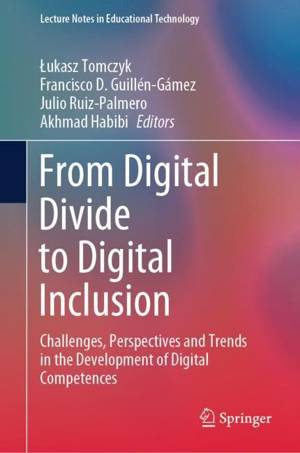
- Retrait gratuit dans votre magasin Club
- 7.000.000 titres dans notre catalogue
- Payer en toute sécurité
- Toujours un magasin près de chez vous
- Retrait gratuit dans votre magasin Club
- 7.000.000 titres dans notre catalogue
- Payer en toute sécurité
- Toujours un magasin près de chez vous
From Digital Divide to Digital Inclusion
Challenges, Perspectives and Trends in the Development of Digital Competences
Description
This book offers an expert perspective on two key phenomena in the development of the information society, namely digital inclusion and digital exclusion. Despite the intensive digitalization of various areas in human activity, the lack of proper information and communications technology (ICT) literacy, the lack of access to high-speed Internet, and the still unsatisfactory level of e-services are a reality in many regions and countries. This edited book presents a unique overview of research related to the dynamics of digital exclusion and the development of digital competences, as well as an analysis of the most effective educational solutions to foster the digital inclusion of disadvantaged groups.
This book is particularly useful for educators dealing with the topic of digital exclusion and inclusion and who are looking for knowledge on enhancing digital competences in disadvantaged groups. It is also helpful for social policy makers involved in designingsolutions to minimize various forms of digital exclusion. Finally, this book serves as a reference for academics and students from the disciplines of pedagogy, social policy, new media psychology, media sociology, and cultural anthropology.
Spécifications
Parties prenantes
- Editeur:
Contenu
- Nombre de pages :
- 565
- Langue:
- Anglais
- Collection :
Caractéristiques
- EAN:
- 9789819976447
- Date de parution :
- 05-02-24
- Format:
- Livre relié
- Format numérique:
- Genaaid
- Dimensions :
- 156 mm x 234 mm
- Poids :
- 984 g






